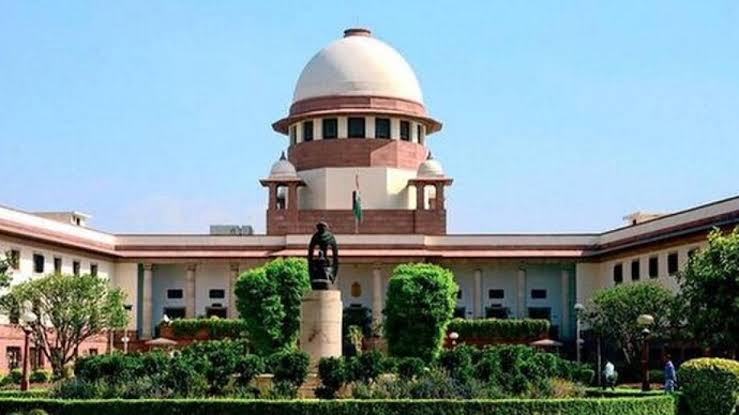Supreme Court rules that once a law is declared unconstitutional, it becomes inoperative from its inception.
Brief Facts of the Case:
The case in question originated from an arrest made under the Delhi Police Special Establishment Act, 1946, in 2007. The arrest was carried out without prior sanction, prompting a legal challenge based on the violation of Section 6A of the aforementioned Act. Section 6A mandated central government sanction for investigations involving certain government officials, specifically those holding the rank of joint secretary and above, in corruption cases. The respondent in the case applied for discharge, arguing that the arrest was made without the previous approval of the Central Government, as required by Section 6A of the DSPE Act. The Special Judge, CBI, rejected the application for discharge, and the matter was taken to the High Court.
Contentions of the Parties:
Appellant (Central Bureau of Investigation – CBI):
The CBI, as the appellant, argued that Section 6A of the DSPE Act should be considered a part of procedural law. It contended that this section did not introduce any new offence, nor did it enhance the punishment or sentence after the commission of an offence. Instead, Section 6A was viewed as a protective measure for senior government servants, requiring central government approval before investigating them in corruption cases. The CBI asserted that the procedure followed in the case, including the arrest, was consistent with the provisions of the DSPE Act, and therefore, Section 6A did not affect the legality of the arrest. The CBI contended that any retrospective application of the 2014 judgment in Subramanian Swamy v. Union of India, which declared Section 6A unconstitutional, would not be warranted in this case. It argued that the retrospective effect of the judgment needed careful consideration.
Respondent (Challenging the Arrest):
The respondent argued that the arrest, which was part of an ongoing investigation, had been made without the prior approval of the Central Government, as mandated by Section 6A of the DSPE Act. The respondent contended that Section 6A of the DSPE Act was not merely procedural but had a substantive impact on the rights and protections available to government officials. Therefore, the arrest without prior approval was illegal. The respondent also questioned the constitutionality of Section 6A, claiming that it violated Article 14 of the Constitution, which guarantees equality before the law. They argued that this provision created a distinction between government officials of different ranks, which was unjust.
Observations by the Court:
The genesis of this landmark ruling lies in the 2014 judgment in the case of Subramanian Swamy v. Union of India, which declared Section 6A of the Delhi Special Police Establishment Act, 1946, unconstitutional. Section 6A had mandated central government sanction for investigations involving certain government officials, specifically those of the rank of joint secretary and above, in corruption cases. The pivotal issue was whether the 2014 judgment declaring Section 6A unconstitutional would have a retrospective effect on pending cases. The recent ruling by the constitution bench has settled this matter, stating unequivocally that its earlier decision will indeed have a 'retrospective operation.' This means that Section 6A of the Delhi Special Police Establishment Act is considered not in force from the date of its insertion, which was September 11, 2003. To reach this conclusion, the court had to delve into the interpretation of 'void' and differentiate between clauses (1) and (2) of Article 13 of the Constitution, which deal with pre and postConstitution laws, respectively. It reiterated that while preConstitution laws would subsist to the extent of their inconsistency with Part III, any post-Constitution law found to contravene Part III would be void ab initio. The court drew strength from a range of judgments, including Mahendra Lal Jaini (1963), which affirmed that pre-Constitution laws found unconstitutional would exist and operate for some time, unlike post-Constitution laws, which are void from their inception. It also cited a recent judgment in The State of Manipur & Ors. v. Surjakumar Okram & Ors., emphasizing that a postConstitution statute declared unconstitutional would be void ab initio.
Case Name: Central Bureau of Investigation v. Dr RR Kishore
Coram: Justices Sanjay Kishan Kaul, Sanjiv Khanna, Abhay S. Oka, Vikram Nath, and J.K. Maheshwari
Case No.: Criminal Appeal No. 377 of 2007
Citation: 2023 Latest Case Law 713 SC
Advocates of the Appellant: Shri Arvind Datar, Sr. Adv., Mr. Amit Desai, Sr. Adv., Mr. Arunabh Chowdhary, Sr. Adv., Mr. Ankur Chawla, Mr. Rahul Pratap, AOR, Mr. Bhanoo Sood, Mr. Aamir Khan, Mr. Shivam Tandon.
Advocates of the Respondent: Mr. Tushar Mehta, Solicitor General, Mr. K M Nataraj, A.S.G., Mr. Suryaprakash V Raju, A.S.G., Mr. Kanu Agarwal, Mr. Rajat Nair, Ms. Sairica S Raju, Mr. Ankur Talwar, Mr. Annam Venkatesh, Mr. Ashutosh Ghade, Mr. Shreeyash U Lalit, Mr. Arvind Kumar Sharma, AOR, Mr. Senthil Jagdeesan, AOR.

